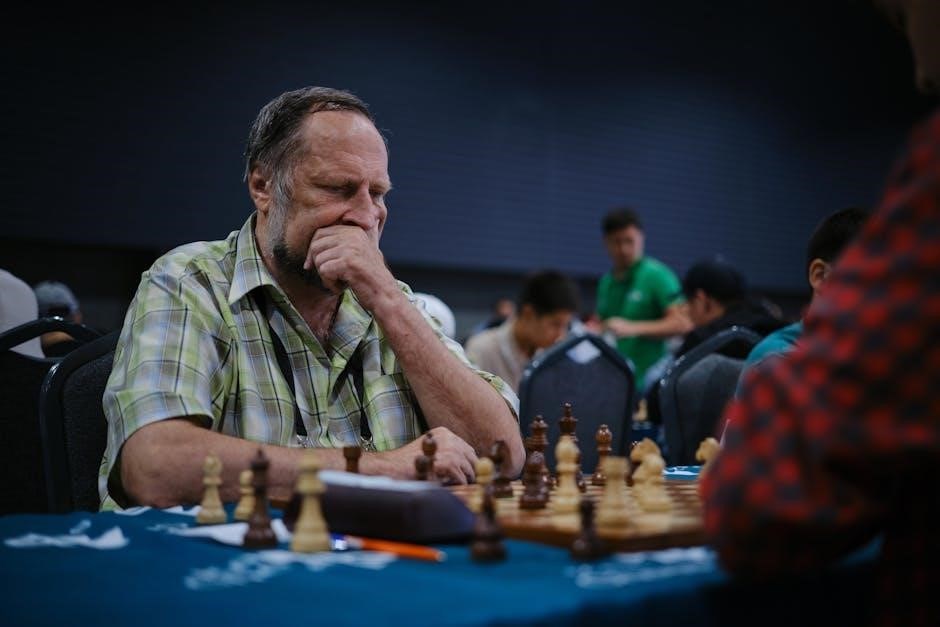
Blink by Malcolm Gladwell explores the power of rapid‚ intuitive judgments‚ revealing how our unconscious mind makes decisions based on limited information‚ often with surprising accuracy.
The Core Premise of the Book
Blink explores how rapid‚ intuitive decisions‚ often made in seconds‚ can be as accurate as thoroughly reasoned ones. Gladwell introduces “thin-slicing‚” the ability to extract meaningful patterns from limited information‚ highlighting both the power and potential pitfalls of unconscious decision-making. The book challenges the notion that deliberate thinking always leads to better outcomes‚ emphasizing the role of intuition while cautioning against biases that can undermine its reliability.
The Concept of Thin-Slicing
Thin-slicing refers to the ability to make accurate decisions based on narrow slices of experience‚ often unconsciously. Gladwell explains how experts can quickly process information‚ focusing on key factors while ignoring irrelevant details. This cognitive shortcut allows for rapid‚ intuitive judgments that are surprisingly reliable. The concept emphasizes the brain’s efficiency in recognizing patterns‚ enabling effective decision-making without extensive deliberation‚ while also highlighting potential vulnerabilities when biases or incomplete information skew these rapid assessments.

The Author: Malcolm Gladwell
Malcolm Gladwell is a journalist and author known for his insightful exploration of human behavior‚ popularizing complex ideas through engaging storytelling in books like Blink.
Background and Contributions to Popular Science
Malcolm Gladwell‚ a renowned journalist and author‚ has significantly contributed to popular science by making complex ideas accessible. Known for his engaging storytelling‚ Gladwell bridges psychology‚ sociology‚ and behavioral economics. His work‚ including The Tipping Point and Outliers‚ has reshaped how people understand human behavior. As a staff writer for The New Yorker‚ Gladwell’s writing often challenges conventional wisdom‚ sparking meaningful conversations. His books‚ such as Blink‚ have become cultural phenomena‚ influencing fields from business to education.
Gladwell’s Other Notable Works
Besides Blink‚ Malcolm Gladwell has authored several influential books. The Tipping Point explores how ideas spread epidemically‚ while Outliers examines the factors behind exceptional success. David and Goliath challenges conventional notions of advantage‚ and Talking to Strangers delves into communication across divides. His works consistently blend storytelling with research‚ making complex ideas relatable and impactful. Gladwell’s unique voice has solidified his status as a leading thinker in popular science and social commentary.

The Science Behind Snap Judgments
Blink reveals how our brain processes information rapidly‚ often unconsciously‚ enabling snap judgments. This process‚ rooted in the adaptive unconscious‚ allows us to make decisions with remarkable speed and accuracy.
The Adaptive Unconscious and Its Role in Decision-Making
The adaptive unconscious‚ a concept central to Blink‚ refers to the brain’s ability to process information rapidly and automatically. This mental process enables individuals to make snap judgments‚ often without conscious awareness. Gladwell illustrates how the adaptive unconscious filters vast amounts of data‚ allowing for decisions that are both efficient and‚ in many cases‚ remarkably accurate. This phenomenon challenges traditional notions of decision-making‚ emphasizing the power of intuition in guiding human behavior.
How Emotions Influence Intuitive Decisions
Emotions play a critical role in shaping intuitive decisions‚ often operating beneath conscious awareness. Gladwell explains that emotions can both enhance and hinder snap judgments‚ depending on the context. While emotional responses may lead to rapid‚ accurate decisions in familiar situations‚ they can also bias perceptions and lead to errors. The interplay between emotion and intuition highlights the complex nature of decision-making‚ where feelings subtly guide the adaptive unconscious‚ sometimes with profound consequences.

Pros and Cons of Rapid Cognition
Blink highlights both the remarkable accuracy and potential pitfalls of rapid cognition‚ emphasizing how snap judgments can be powerful yet flawed‚ influenced by context and unconscious biases.
When Snap Judgments Are Accurate
Snap judgments are most accurate when they rely on unconscious patterns learned through experience and expertise. For instance‚ art historians can instantly identify forgeries‚ and emergency room doctors make life-saving decisions quickly. These rapid assessments succeed when individuals have extensive experience‚ allowing their unconscious mind to filter irrelevant details and focus on critical factors. However‚ accuracy depends on the quality of past experiences and the absence of biases‚ highlighting the importance of context in intuitive decision-making.
The Pitfalls of Relying Solely on Intuition
Despite its power‚ intuition can fail due to biases‚ stereotypes‚ and limited information. For example‚ the tragic case of Amadou Diallo highlights how snap judgments by police led to a fatal error. Emotional states and cultural conditioning can distort quick decisions‚ leading to inaccurate outcomes. Over-reliance on intuition without reflection or additional data can result in costly mistakes‚ emphasizing the need for a balanced approach between instinct and deliberation in decision-making processes.
Real-Life Examples from the Book
Blink features real-life examples like the art historian who instantly identified a fake sculpture and the tragic shooting of Amadou Diallo‚ illustrating both the power and pitfalls of rapid decisions.
The Case of the Art Historian and the Forged Sculpture
In Blink‚ Malcolm Gladwell recounts the story of an art historian who instantly recognized a forged sculpture‚ despite scientific tests confirming its authenticity. This example highlights the power of thin-slicing‚ where the unconscious mind processes subtle cues to make rapid‚ accurate judgments. The historian couldn’t explain his decision‚ yet his intuition was correct‚ illustrating the book’s central theme of the reliability of snap decisions over deliberate analysis.
The Tragic Story of Amadou Diallo
In Blink‚ Malcolm Gladwell discusses the 1999 shooting of Amadou Diallo‚ an unarmed African immigrant‚ by New York City police officers. The officers‚ acting on rapid judgments‚ fired 41 shots‚ killing Diallo. This event highlights the dangers of snap decisions influenced by stress‚ stereotypes‚ and high-pressure situations. Gladwell uses this case to illustrate how intuition can fail when emotions and biases override rational analysis‚ leading to devastating consequences.
Key Takeaways for Decision-Making
Blink teaches us to trust our gut feelings but remain aware of their limitations. It emphasizes mastering thin-slicing and balancing intuition with critical analysis for better outcomes.
How to Trust Your Gut Effectively
Trusting your gut effectively involves harnessing the power of thin-slicing‚ where the unconscious mind quickly processes patterns from experience. Gladwell suggests that intuition works best when honed through expertise‚ but it’s crucial to recognize when biases or incomplete information may distort judgments. By balancing intuition with critical analysis‚ decision-makers can leverage their gut feelings while minimizing errors. This approach encourages mindfulness of the subconscious processes that shape rapid decisions‚ fostering more reliable and informed outcomes in both personal and professional realms.
Practical Strategies to Improve Intuition
Enhancing intuition requires deliberate practice and self-awareness. Gladwell emphasizes the importance of recognizing patterns through focused training and experience. Individuals can improve their snap judgments by exposing themselves to diverse scenarios‚ reflecting on past decisions‚ and staying attuned to their emotional cues. Additionally‚ cultivating mindfulness helps in distinguishing between genuine intuition and bias. By refining these skills‚ one can develop a more reliable and adaptive intuition‚ leading to better decision-making in high-pressure situations.
Applications in Various Fields
Intuition plays a crucial role in business‚ healthcare‚ and law enforcement‚ enabling quick decisions and pattern recognition‚ enhancing efficiency and accuracy in diverse professional settings.
Intuition in Business and Leadership
In business and leadership‚ intuition often guides rapid decision-making‚ helping executives spot opportunities and avoid pitfalls. Experienced leaders develop this skill through years of pattern recognition. Gladwell highlights how intuition can be a powerful tool in high-stakes environments‚ enabling swift‚ decisive actions. However‚ he also warns that relying solely on gut feelings can lead to errors if biased or misinformed. Balancing intuition with data ensures more informed choices‚ fostering trust and effectiveness in leadership roles.
The Role of Snap Judgments in Law Enforcement
In law enforcement‚ snap judgments are crucial for officer safety and decision-making. Gladwell examines how police officers rely on rapid‚ intuitive assessments to respond to high-pressure situations. While these judgments can save lives‚ they can also lead to tragic errors‚ as seen in cases like Amadou Diallo’s shooting. The book underscores the importance of training to improve the accuracy of these split-second decisions‚ balancing instinct with accountability to minimize risks and enhance public trust in law enforcement actions.

Criticism and Controversies
Some critics argue that Blink oversimplifies the complexity of intuition‚ ignoring the potential for biases and errors in rapid decision-making. While engaging‚ it lacks scientific rigor.
Challenges to Gladwell’s Arguments
Critics argue that Gladwell’s ideas in Blink oversimplify the complexity of intuition‚ often ignoring the role of biases and cultural influences. Some scholars claim the book lacks scientific rigor‚ as it relies heavily on anecdotes rather than comprehensive research. For instance‚ the tragic case of Amadou Diallo highlights how rapid judgments can lead to devastating errors‚ questioning the reliability of snap decisions. These criticisms suggest that Gladwell’s theories‚ while compelling‚ require a more balanced and nuanced approach.
Scientific Reception of the Book’s Ideas
The scientific community has had mixed reactions to Blink. While Gladwell popularized concepts like thin-slicing and the adaptive unconscious‚ some experts argue his ideas oversimplify complex psychological processes. Critics note that his reliance on anecdotes rather than comprehensive studies weakens the book’s scientific foundation. Despite this‚ the book has sparked important discussions about intuition’s role in decision-making‚ encouraging further research into the mechanisms behind rapid cognition and its limitations.
Blink challenges readers to embrace the power of intuition while remaining mindful of its limitations‚ encouraging a balanced approach to decision-making that blends instinct with deliberation.
Summarizing the Power of Thinking Without Thinking
Blink highlights the extraordinary ability of the unconscious mind to process information and make rapid‚ accurate decisions through “thin-slicing.” Malcolm Gladwell demonstrates how experts leverage this skill to filter crucial details from overwhelming data‚ often achieving better outcomes than deliberate analysis. However‚ the book also cautions against over-reliance on intuition‚ emphasizing the importance of understanding when and why snap judgments succeed or fail. It ultimately advocates for a balanced approach to decision-making‚ blending instinct with awareness.
Encouraging Mindful Use of Intuition
Malcolm Gladwell emphasizes the importance of balancing intuition with awareness. While snap judgments can be powerful‚ they require mindfulness to avoid biases and errors. By understanding the unconscious processes driving our decisions‚ we can harness intuition more effectively. Gladwell suggests trusting gut feelings but also reflecting on their origins to ensure accuracy. This mindful approach fosters better decision-making by combining instinct with deliberate thought‚ ultimately enhancing the reliability of rapid cognition in both personal and professional contexts.

Further Reading and Resources
Explore summaries on Blinkist‚ Soundview Executive Book Summaries‚ and Blink’s dedicated page for deeper insights into Gladwell’s concepts and related discussions on intuition and decision-making.
Additional Books on Intuition and Decision-Making
For further exploration‚ consider The Tipping Point and Outliers by Malcolm Gladwell‚ which delve into human behavior and decision-making. Thinking‚ Fast and Slow by Daniel Kahneman explores cognitive biases‚ while The Power of Habit by Charles Duhigg examines intuition in habit formation. Predictably Irrational by Dan Ariely and Nudge by Richard Thaler offer insights into irrational decision-making and subtle influences on choice‚ complementing Blink’s themes of rapid cognition and intuition.
Online Courses and Lectures on Related Topics
covers intuition‚ while Harvard’s Behavioral Economics examines decision-making biases. TED Talks‚ such as Daniel Kahneman on the Biases of Intuition‚ offer insights into rapid cognition. These resources complement Blink by providing practical tools to understand and enhance intuitive decision-making in various fields‚ from business to everyday life.